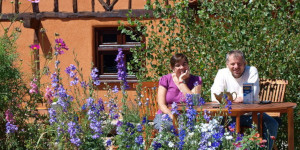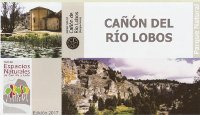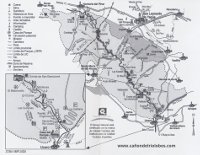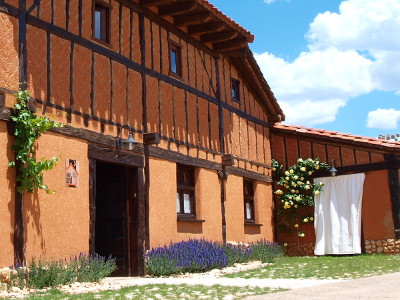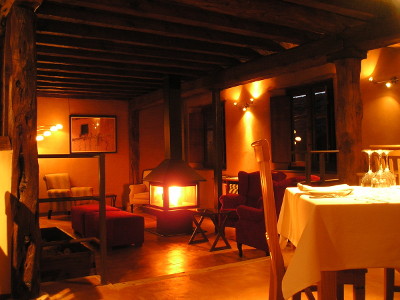All the basic information you need to visit
The Rio Lobos Canyon Natural Park
- 1. Why visit the Río Lobos Canyon?
- 2. Where is it?
- 3. Where do I need to go?
- 4. Are there opening times, entrance fees or other restrictions?
- 5. Are the walking trails challenging?
- 6. Is there a visitor centre?
- 7. What is the best time of year to visit ?
- 8. Are there shops, bars, restaurants, water fountains...?
- 9. Is the Templar chapel open to the public?
- 10. Any special recommendations?

The park's logo
1. Why visit the Río Lobos Canyon?
The Rio Lobos Canyon is a spectacular 25 km long gorge carved out through a limestone plateau and often cited as one of the prettiest landscapes in Spain.
It is a 10,000 hectare Natural Park, a Site of Community Interest and a Special Conservation Area for Birds.
It is well known for its walking trails, the esoterical Templar chapel of Saint Bartholomew, its caves, bats, and its large resident colony of griffon vultures.
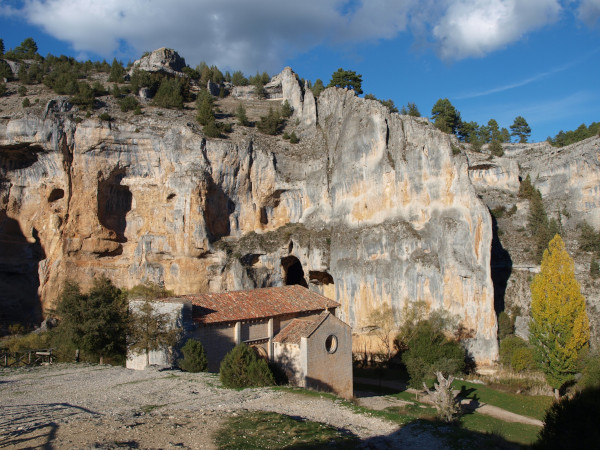
Natural setting of St Bartholomew's chapel
2. Where is it?
The Rio Lobos Canyon lies at the eastern end of Castile and Leon region, one third in the province of Burgos and two thirds in the province of Soria.
It is two hours north of Madrid, three hours south of Bilbao, and roughly halfway between Santander and Valencia.
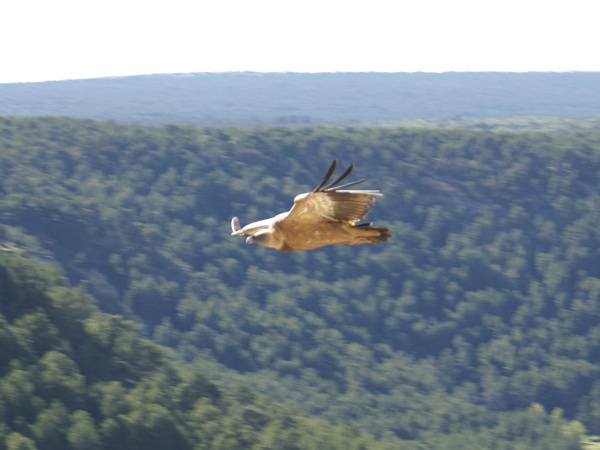
Vulture watching at the Galiana viewpoint
3. Where do I need to go?
The park can be accessed from several points, but the most spectacular landscapes and the main attractions lie at the bottom end of the canyon, close to the village of Ucero in Soria, on the SO-920 road between San Leonardo de Yagüe and El Burgo de Osma.
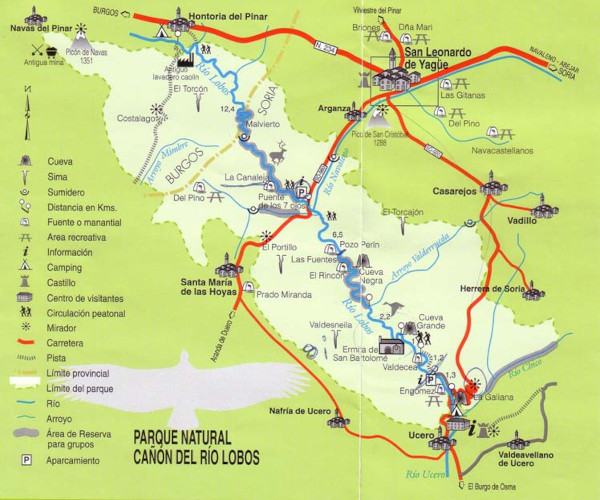
Location map
4. Are there opening times, entrance fees or other restrictions?
Access to the park is completely free, there are no fences and no gates, and restrictions apply only to groups of more than 20 persons. The only other restriction is natural, when heavy rains in winter-spring can make parts of the canyon inaccessible.
A parking charge is made at weekends and peak times in the car parks located inside the canyon (motorbikes 2€, cars 4€, camper vans 6€ and buses 10€).
Camper vans may stay overnight in the car park at Puente de los Siete Ojos, and for two nights in the Área de Autocaravanas de Hontoria del Pinar.
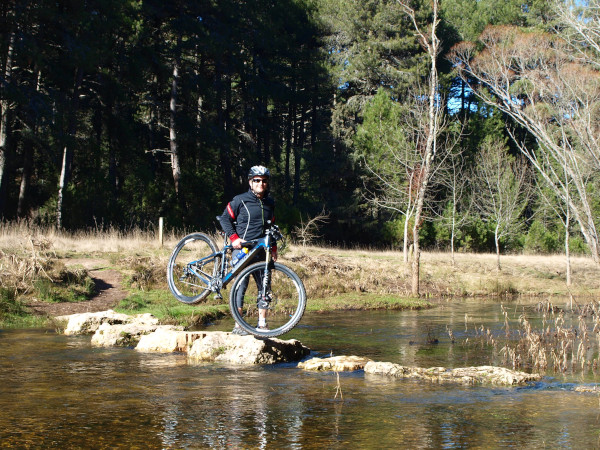
Cyclist crossing the river Lobos
5. Are the walking trails challenging?
There are plenty of signposted walks throughout the park, so lots of choice to pick the right distance for you, from a short stroll to see the famous Templar chapel of Saint Bartholomew to serious trails that run the length of the park.
Most of the walks on offer are easy, the only real complications being the stepping stones at river crossings and occasional rough and rocky areas. Flooding may leave some footpaths wet and muddy.
The terrain is mostly flat, following the course of the river, though some routes may climb up steep hillsides from the canyon floor to the top of the plateau.
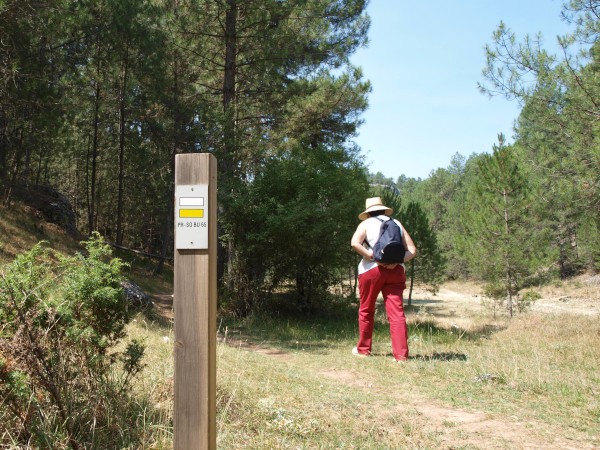
The River Trail upstream of Puente de los Siete Ojos (summer)
6. Is there a visitor centre?
The "Casa del Parque", just outside the village of Ucero, was fully refurbished in 2012 and offers an interesting interactive exhibition on the ecosystems and species found in the park.
It also has a small bookshop, leaflets (basically only in Spanish) and helpful staff who can be consulted in case of any doubt. There is a charge of 1€/person to visit the exhibition.
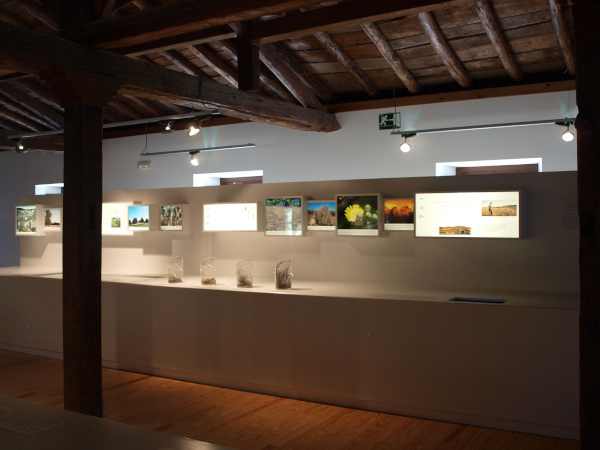
The "Casa del Parque" visitor centre
7. What is the best time of year to visit?
The Rio Lobos Canyon can be visited throughout the year, each season has its pros and cons, but autumn is probably the busiest time of year in the park as Spanish city-dwellers tend to see rural tourism as an autumnal activity.
Personally we think the late-spring months of May and June are absolutely the best time for a visit. There is crystal-clear water in the streams, green grass on the hills and flowers at the wayside. The longest days of the year make for great days out without the intense heat of the summer.
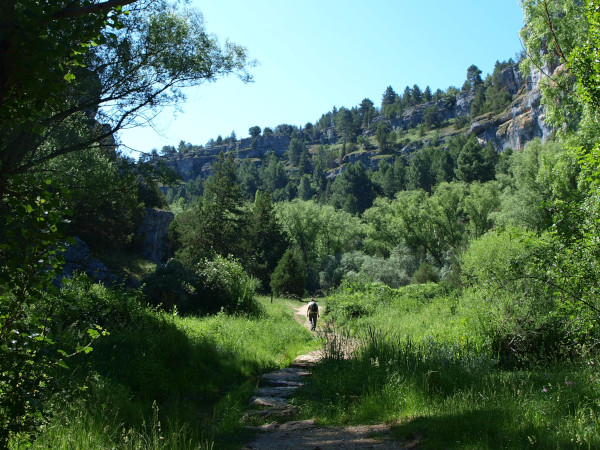
Rio Lobos Canyon in Spring
8. Are there shops, bars, restaurants, water fountains...?
You can fill you water bottle at fountains in all the car parks inside the canyon, but there are no sources of drinking water along the walking trails.
At Fuente Engómez, at the Ucero end of the canyon, there is a bar, and another in the adjacent campsite next to the visitor centre.
You may find restaurants or bars in the nearby villages of Ucero, Valdemaluque, Casarejos, San Leonardo, Hontoria del Pinar and Santa María de las Hoyas but shops and bakeries only in the larger villages or nearby towns such as San Leonardo and El Burgo de Osma..
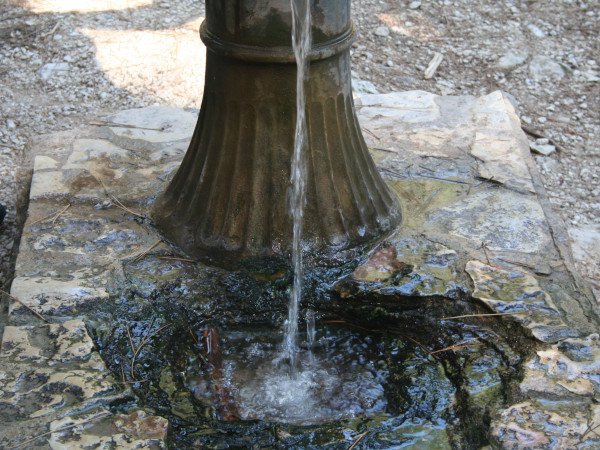
Drinking water fountain at Valdecea
9. Is the Templar chapel open to the public?
Opening times are set by the Diocese of Osma, but are not hard and fast. In recent years they have been roughly as follows:
- Easter onwards: Saturdays from 11:00 to 15:00 and from 17:00 to 19:00, and Sundays from 11:00 to 15:00.
- Month of August and up to 15th September: Tuesday to Saturday from 11:00 to 15:00 and from 17:00 to 19:00; and Sundays from 11:00 to 15:00. Mondays closed.
- From 15th September to 8th December: Saturdays from 11:00 to 15:00 and from 17:00 to 19:00, and Sundays from 11:00 to 15:00.
An admission fee of 1€/person is charged.
For more information call the Diocese of Osma on +34 975 340 000.
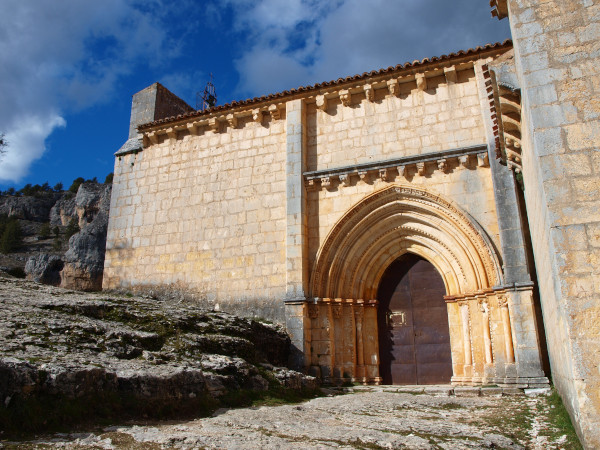
St Bartholomew's Chapel
10. Any special recommendations?
We recommend avoiding very busy times like Easter, October bank holiday, mid August and certain other weekends and public holidays, or at least come early in the morning to beat the crowds.
Most visitors tend to flock to the chapel area, but don't forget there are 10,000 hectares of park and most areas are nearly always quiet with few visitors.
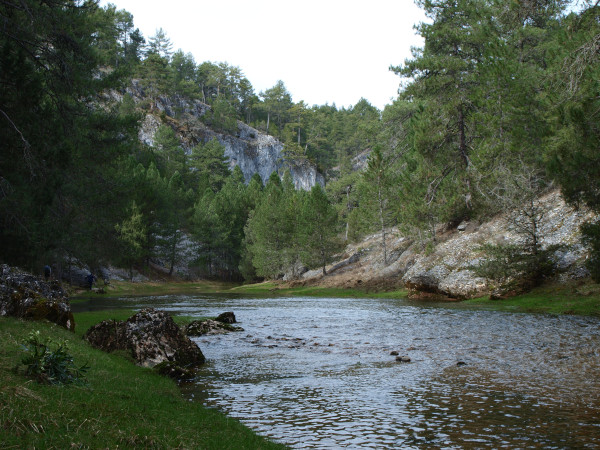
River Trail upstream of Puente de los Siete Ojos (Spring)
Remember that we are about 1,000 metres above sea level, and the sun burns brightly here. Don't forget your solar protection cream and a hat to shade your head.
On windless days the hot sunshine and humidity on the canyon floor can make for a heavy atmosphere, so be sure to carry a good supply of drinking water and revitalising snacks with you.
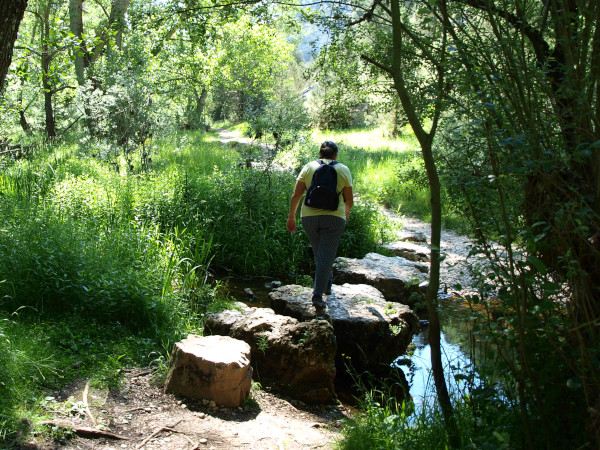
Stepping stones to cross a branch of the river Lobos
The walking trails are not difficult but the ground can be uneven underfoot, so a stout pair of walking boots is always recommendable in order to avoid the risk of a twisted ankle.
When calculating how long your walking route will take you, don't forget to leave plenty of time for photo taking and vulture watching.
And have fun!!!
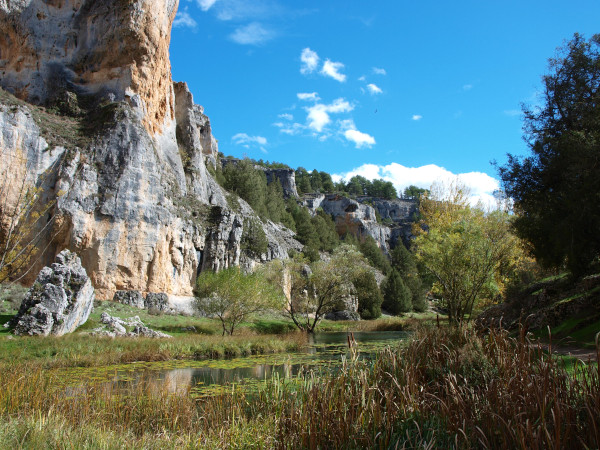
Lily pads on the river Lobos

